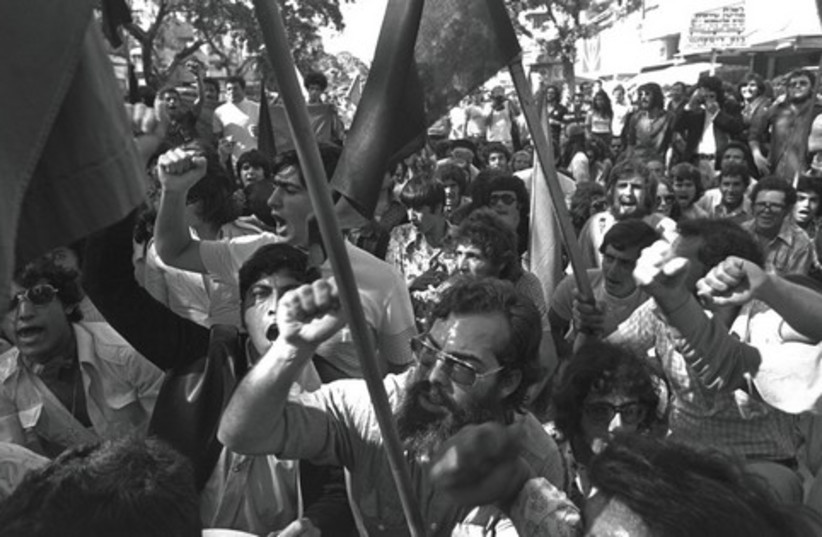Charlie Biton, the Moroccan Israeli activist and politician who led the Mizrahi Black Panther movement in the 1970s and went on to serve as an MK for 15 years, died on Saturday at the age of 76.
Born in Casablanca, Morocco, in 1947, Biton immigrated to Israel with his family at the age of two and was raised in Jerusalem’s Mizrahi-majority Musrara neighborhood, west of the Old City.
In 1971, Biton was among the founders of Israel’s “Black Panther” movement, based on the American “black power” organization but championing the rights of Israelis of Middle Eastern and North African descent against discrimination by the dominant Ashkenazi elite.
In May 1971, the Black Panthers led a rally with an estimated 5,000 to 7,000 people that began in Jerusalem’s Davidka Square and proceeded toward Zion Square. Clashes broke out between protesters and the police, and about 70 people were arrested.
Along with demonstrations, the Black Panthers organized various stunts. One of them was the “Milk Operation” in 1972 when bottles of milk that were intended for residents of Jerusalem’s wealthy Rehavia neighborhood were taken and distributed to residents of so-called “asbestos buildings” in poorer neighborhoods, including Kiryat Yovel.

The Rehavia residents, upon looking for their milk, instead found signs that said: “We thank you for deciding to give your milk to hungry children instead of the dogs and cats in your homes.”
Then-prime minister Golda Meir was infamously quoted as having derided the Black Panthers as “not nice people.” (In a contemporaneous letter released by the State Archives in June 2013, however, Meir said she was referring to “those who riot and throw Molotov cocktails at police.”)
That moniker was adopted in 2011 by locals as the name for a Musrara alleyway, affixing a signpost naming the location “They’re Not Nice Alley.”
Biton served in Knesset for 15 years, mostly on Hadash list
In 1973, Biton ran for the Knesset with the Black Panthers Party. The group received 13,332 votes, or 0.9% of the total, falling short of the 1% threshold to enter the Knesset.
The following year, in February 1974, Biton was arrested for assaulting a police officer. He went into hiding to avoid prison but ultimately turned himself in. He was granted clemency shortly after beginning his term, however, amid lobbying from Rabbi Ovadia Yosef, who was the Sephardi chief rabbi at the time, and Shulamit Aloni, the left-wing MK who had just founded the peacenik Ratz Party, which merged into Meretz in 1997.
Biton had more success running for Knesset in 1977 when he ran on the list of Hadash, the Communist party represented by both Jews and Arabs, as part of the Black Panthers faction.
In September 1980, Biton was the first MK to meet publicly with the leaders of the PLO, including Yasser Arafat. They met in Bulgaria, and Biton said he had a mandate from his constituents to seek peace. In 1987, Biton led an Israeli delegation to Budapest, where he met with Fatah’s Mahmoud Abbas, the current president of the Palestinian Authority.
A Mizrahi will "never be elected prime minister"
Thirty years later, however, Biton struck a more pessimistic note in an interview with Ynet, rejecting the possibility of a two-state solution and saying the Palestinians “have methods that fit the Middle East that Ashkenazim will never understand.”
In that interview, Biton also predicted that a Mizrahi would “never be elected prime minister... The state will not allow such a thing, nor will the media, which belittle Mizrahim and favor Arabs. Even if there remains only one Ashkenazi in the country, he will be prime minister.”
Biton remained with Hadash until 1992 when he left to represent an independent Black Panthers faction. That year, he ran for Knesset on the Hatikvah list, which failed to pass the electoral threshold, ending his tenure in the Knesset.
In the years following his departure from the Knesset, Biton largely avoided party politics. In 2015, he endorsed the haredi Shas Party, founded by Rabbi Ovadia Yosef and a major force in Mizrahi life in Israel, despite having criticized the party in the past.
Herzog eulogizes Biton as a groundbreaking activist
President Isaac Herzog eulogized the late activist as “a groundbreaking social and political leader who led an important, courageous, and determined public struggle for Mizrahim, in particular, and the underprivileged, in general.”
Biton was buried Saturday night in Givat Shaul.
Natan Rothstein contributed to this report.
